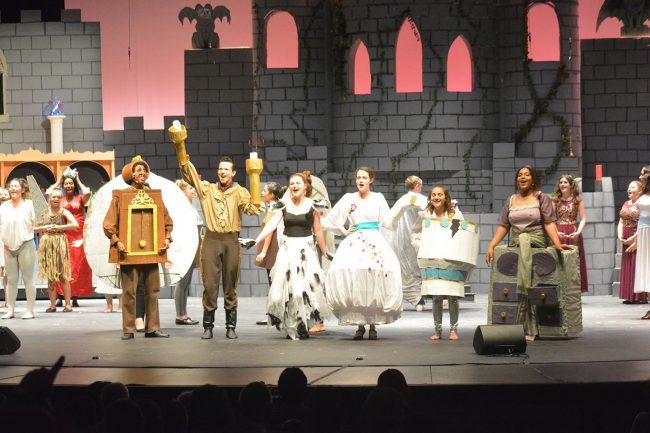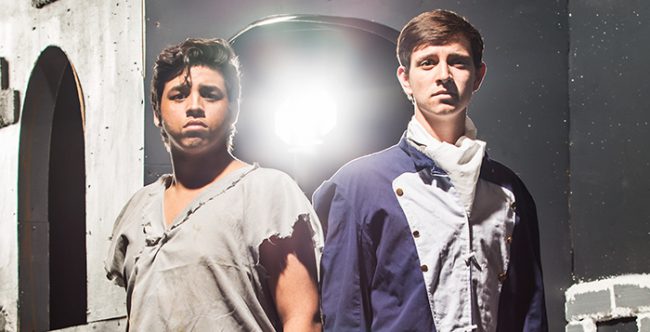A little over 10 years ago, I was teaching high school English in a Title I district. Teacher wages had been frozen for years, education funding was slashed, and copy paper was locked up like it was gold. Programs were being cut and teachers were RIF’d (Reduction-In-Force). The drama program at our school disappeared.
And then, serendipitously, I had the chance to bring it back. There was no class and the defunct club fund had only $12. I wouldn’t get any district money and I felt like I had one shot to do it right. So I borrowed $200 from the student council to make a cheap set and purchase a few props. I scavenged through a rickety metal cabinet for any costumes or props that might be of use. I handed out audition forms in my English classes and cajoled anyone who had interest to participate. Finally,we put on Shakespeare’s Comedy of Errors on the lecture hall stage.
Within five years, our program was back. Along with other performing arts teachers, I helped open the brand-new, multi-million dollar performing arts center. My program grew from an after-school club of a few dozen to a full schedule of hundreds of students. I directed big budget shows like Jekyll & Hyde, Beauty and the Beast, and Les Misérables. We competed at the International Thespian Festival. And all of this without any money from my district.

How does funding a program happen? The key is to know where to look!
Finding the Money in the School
It goes without saying that any school program must be funded to be functional. Some programs and curriculum were funded by the district business office, but drama wasn’t one of them. However, although they didn’t fund the program, I did get money from the district coffers, because it was specifically put aside for drama. In other cases, I had to apply for funds, and I was fortunate to have a mentor who could tell me exactly where to look and who to ask for help.
Class Fees
As much as I hated to charge students to take my classes, class fees became a necessary evil. I argued to keep these fees as low as possible (generally $15 a semester) so that every student could have access–something very important to me, especially in our Title I district. But class fees ensured that I could buy scripts, material for costuming projects, and even partially fund field trips to see professional touring companies.
Tax Credit Money
Once our program was more well-known in the community (and the local news media regularly wrote glowing reviews of our shows), community members donated to the school’s tax credit fund. These donations were specifically designated for the drama program, and could pay for a wide range of things–as long as the purchase met the criteria (usually related to accessibility of the program to the larger student body).
Federal Grant Money
As I mentioned, we were a Title I district–more than half of our students qualified for free or reduced lunch prices. Because of that statistic, federal grant money was made available to supplement school funding. Also, based on the diversity of our district (especially the strong Native/Indigenous American population), grant money was available to enrich learning for our students. Generally, these funds were put directly into the classroom to purchase books and other learning materials. Similarly, technology grants were often available–especially for STEAM projects (Science-Technology-Engineering-Arts-Math). Research your district to see what grant money is potentially available.

Administration
Get to know the business office personnel. They have financial insights that most teachers don’t, and their expertise can help you manage the various funding sources available.
Community Support
Our drama program was two-fold: classroom and company. The company got absolutely nothing from the district, so we had to look to our town for support.
Network
Build a strong rapport with local media so that they’ll not only write a review of the show after the fact, but write a preview that will encourage the community to come in the door. I started sending emails and making phone calls to the two competing news outlets–and both graciously showed up to interview students, take pictures, and write wonderful articles. The local media–beyond just social media–was instrumental in getting the word out about our shows. The spring that we did Les Misérables, not only did we have a three-page article in the monthly news magazine, but two of my students were on the cover.

Box Office
The key is to budget carefully. Always know exactly how much money is in the club account, and precisely anticipate costs for productions. When the community knows about the shows, they’ll show up to support the program. Eventually, box office returns made the program completely self-sustaining, able to fund anything we needed.
Fundraisers
In the old days, fundraisers were based in catalogues, whether cookie dough or candles. While many of these types of fundraisers still happen, businesses are often ready to support local school programs. Chain restaurants like McDonald’s, Panda Express, and Chipotle (to name only a few!) can host events in which a percentage of their sales on a certain day go to the school–or school program. Check out the businesses in your area to see if any participate. If it’s a chain restaurant, it often has to have corporate-level approval, so plan months in advance.
Donations
Beyond tax credit donations or ticket sales, there are times we just had some very generous and supportive community members that respected our work. A few times, following the curtain call of a performance, someone that I didn’t know approached me, congratulated me and our students, and handed me a check.
Final Thoughts on Money
As much as we focus on the art, showing students how to understand the business of theatre is equally as important.
Be thankful and gracious stewards of theatre, especially when someone invests in the program.
Anything you personally purchase for your classroom is tax-deductible–save your receipts!
And finally, good luck!
















